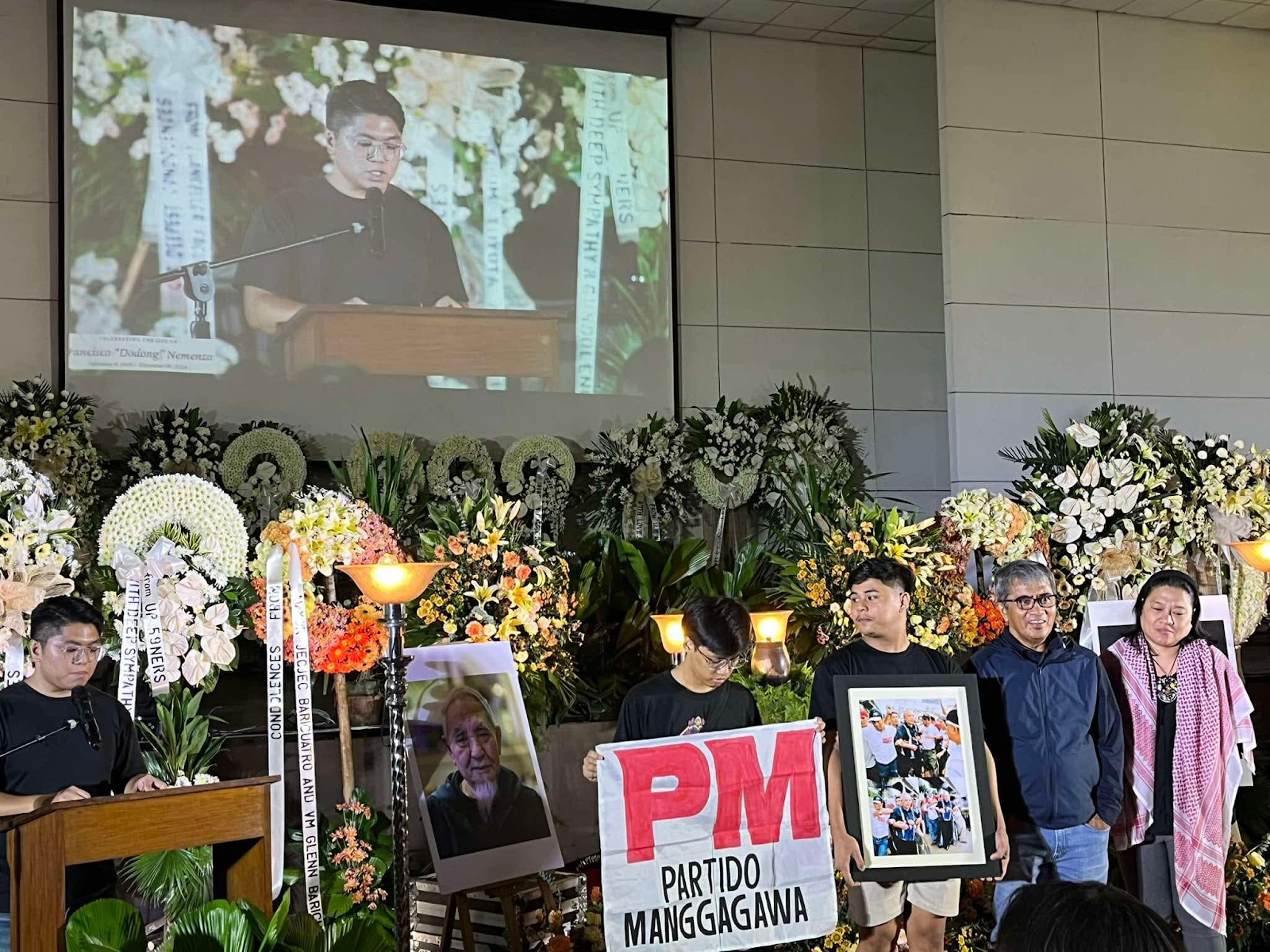Nagbibigay-pugay ang Partido Manggagawa kay Ka Dodong
Nemenzo habang nakikiramay sa kanyang mga naiwang mahal sa buhay--si Princess
at kanyang mga anak at kapatid.
Sa pagpanaw ni Ka Dodong ay parang nawalan ng isang tatay
ang progresibong kilusan sa Pilipinas. Walang dudang isa syang father figure para
sa maraming grupong pampulitika, Mga grupong madalas nagbabangayan tulad minsan
ng mga magkakapatid. Pero kumporme sa sitwasyon naman ay nagkakaisa din. At sa
mga pagkakataong yun ay malamang nasa gitna si Ka Dodong.
Ayon sa nasusulat, inamin ni Ka Dodong sa UP Board of Regents
na sya ay isang komunista--pero bilang indibidwal na paniniwala hindi bilang
kasapi ng isang Partido. Sa kasong ito, ang isang kahinaan ay naging isang kalakasan.
Ang natatanging papel na ginampanan si Ka Dodong ay bilang kinikilalang lider
na pinagkakatiwalaan at pinakikinggan ng iba’t ibang mga grupo.
Sa papel na iyan nakaugnayan ng PM si Ka Dodong.
Pinakamatingkad ito noong naging susing lider si Ka Dodong sa pagbubuo ng Laban
ng Masa sa yugto ng pakikibaka para ibagsak ang rehimeng Gloria Arroyo. Bukod
sa pagbibigkis ng iba’t ibang militanteng grupo ay natahi ni Ka Dodong maging ang
mga rebeldeng sundalo noong panahong iyon. Bilang lider ng Laban ng Masa ay kalahok
si Ka Dodong di lang sa pagbabalangkas ng mga taktika at plano kundi kakapit-bisig
sa mismong mga protesta at pagkilos sa kalsada.
Bukod sa matalas ang kanyang isipan ay malakas pa ang
kanyang pangangatawan noon. Para sa mga lider at kasapi ng PM na
nakaupang-palad ni Ka Dodong noong panahong iyon, ay buhay na buhay ang
pagiging scholar-activist niya.
Ito rin ang dahilan kung bakit, bago pa man pormal na
maitayo ang PM, naging masugid na ka-diskusyon ni Popoy Lagman si Ka Dodong.
Noong panahon ng isplit sa CPP noong 1990’s ay isa si Ka Dodong sa mga hiningan
ng opinyon at katalakayan ni Popoy sa pagsusumikap na dalisayin ang teorya at
praktika ng pagrerebolusyon sa ating bansa. Sigurado isa sa mga napag-usapan
nila ay ang karanasan ng PKP sa pagbubuo ng isang elektoral na partido ng manggagawa.
Kalaunan ay pangungunahan ni Popoy ang pagtatatag ng PM bilang kaganapan ng
ideyang ito.
Nakakalungkot na wala na sila pareho. Pinaslang si Popoy ng mga
kaaway ng manggagawa. Si Ka Dodong naman ay ginapi ng matinding sakit.
Malaking kawalan na mula noong 2016 na nagkasakit si Ka
Dodong ay di na sya kasing-aktibo. Ganunpaman nakakasalamuha pa rin namin sya
pana-panahon sa mga talakayan laluna’t nananatili namang malinaw ang kanyang
kaisipan at punong-puno pa rin sya ng mga ideya ukol sa pagsusulong ng
pakikibaka para sa pagbabago. Hanggang nitong nakabalik ang isang Marcos sa Malacanang
ay kasa-kasama pa natin si Ka Dodong sa mga pagpupulong. Kahit na naka-wheelchair
at hirap ang pangangatawan ay matalas pa din ang kanyang pagsusuri sa mga bagay-bagay.
Pumanaw man si Ka Dodong ay hindi na nabubura ang kanyang
ambag sa pagsusulong ng progresibong kilusan sa Pilipinas. Para sa mga anak-anakang
naiwan ng isang father-figure ng progresibong kilusan, isang karangalan at
responsibilidad na ipagpatuloy ang kanyang nasimulan. Nasa balikat natingipagpatuloy
at ipagwagi ang kilusan para sa pagbabago.
Mabuhay ang alala ni Ka Dodong! Tuloy ang laban!

